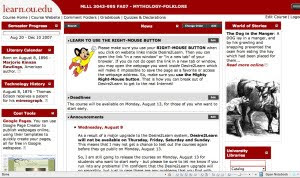We have been using WebCT since 1999 and it is soon to be defunct when Blackboard, its current owner, will no longer support it. I have invited faculty to review some options and we have narrowed our search to Desire2Learn, a Canadian company which has managed to escape Blackboard's buyout, and Moodle, an open source course management system supported by Moodlerooms.
Let's clarify. An open source course management system is based on software which is not copyright protected. Since the source code for the software is available to anyone, users may change it, add to it and improve it as they see needs arise. And it is free.
So, why use a course management system? It is most advantageous to non-traditional students who may live at a distance from campus or cannot come to campus for classes. But these are not the only students who can benefit.
Perhaps an instructor wants computer-based or internet-based enhancements to their instruction. This is done by giving students access to specific information, access to each other in discussion groups, by calculating and posting grades online, by creating test banks and controlling access to tests, or by providing a learning environment very different from a traditional classroom — all in a password-protected online world.
And what about the online world at large? How can one gain access to people and information on the internet? A course management system can gather in one place controlled access to social networking tools and provide guidelines for students working on the internet.
Let's clarify. Social networking tools are free internet-based applications that allow one to share information and media with others. Examples include the ubiquitous Facebook, blogs, Twitter, YouTube, and Flickr, as well as the somewhat lesser-knowns, such as Ning, Meebo, dimdim, and SlideShare (see the ATS website for explanations). Note that though you may be able to control your privacy to some extent, you should consider social networking tools as opening your life up to the world.
So why not use a blog instead of a course management system? Simply put, ease and control. Most course management systems are quite linear in design, offering a default set of elements: drop box, discussion list, gradebook, chat room, email. These tools reflect a fairly traditional teaching approach - presentation, discussion, assessment - and most instructors use these elements easily and successfully. And most instructors are effective in classes organized on this model, whether in class or online. Here is a traditional course management system.
However, more modern course management systems offer more customization and new features associated with social networking tools, such as wikis and blogs. The course itself can look different and can be laid out as a portal (or not - there are choices). The portal layout will still give access to the traditional course management tools, but it changes how the instructor designs the course and how students interact with the tools. The portal design looks more like a website or a blog and may encourage delving into the tools to see which ones serve one's needs and which tools will further the learning objectives of the course.

Most instructors want to know what a course management system - or any technology - can do and how hard is it to learn. I think a better question is how can a course management system, or any technology, meet my pedagogical goals and my students' learning objectives?
How might an instructor's choice of course management tools be affected or determined by learning objectives? Consider these broad learning objectives:
- Students will demonstrate a depth of knowledge and apply appropriate methods of inquiry
- Students will interpret information, respond and adapt to changing situations, make complex decisions, solve problems, and evaluate actions
- Students will demonstrate the inclination to be life-long learners, a concern to become and remain well informed, the ability to retrieve and manage information appropriately, open-mindedness regarding divergent worldviews, and a willingness to reconsider and revise their own views when warranted (K-State Undergraduate Student Learning Outcomes. http://www.k-state.edu/assessment/slo/undgradobj.htm Retrieved 3/30/10).
- How is a student's understanding of drug rehabilitation programs (for example) enhanced by access to actual programs and counselors online? How can that knowledge be share and compared with other students, even those at other universities?
- How does a student-run blog help students interpret, respond and adapt to new information?
- How can an instructor encourage students' innate or latent curiosity in a subject with internet and course management tools?
We will move into a new phase of online learning and teaching when we choose a new course management system. How will we make our courses more effective, more responsive to learning objectives, more responsive to students? How can we enrich our students' learning? What new tools, or old ones, will we choose?
And, finally, how will we avoid this technology trap:
"Men have become the tools of their tools." -- Henry David Thoreau, Walden

